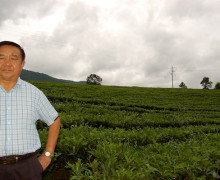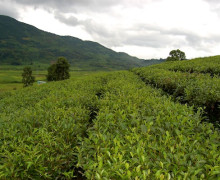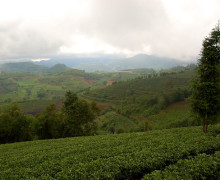{Author’s Note: I wrote this on my recent visit to Lincang County in Yunnan, and am just getting around to posting it. Sorry for the delay, my jet lag has slowed me down a bit. This piece has already been published on TChing.com.}
 It’s been raining here for days. That means there is no hot water because the solar water heating system hasn’t seen the sun in days. It is muddy in the tea gardens, and there is a distinct coolness pointed out to me by the locals, that indicates fall is coming. Fall here is kind of like fall in Tucson, it is hard to distinguish it as a separate season, but the local people still can feel it in their bones.
It’s been raining here for days. That means there is no hot water because the solar water heating system hasn’t seen the sun in days. It is muddy in the tea gardens, and there is a distinct coolness pointed out to me by the locals, that indicates fall is coming. Fall here is kind of like fall in Tucson, it is hard to distinguish it as a separate season, but the local people still can feel it in their bones.
I first came to Yunxian in 2005 after a trip to Dubai. I had been invited to Dubai to become a member of the newly formed Dubai Tea Trading Center. Dubai wanted to become the hub of tea distribution and was providing remarkable incentives for companies to set up business there. I’m not very interested in commercial tea, then or now, but I am very interested in the distribution networks that affect the tea industry.
I made a couple of trips there and got a very good education about the inner workings of how international tea flows, under the tutelage of Sanjay Sethi, the director of the new center. Sanjay is a certified tea taster who comes from a family of tea merchants that has been involved in the tea trade almost from its beginnings in India.
Sanjay was tasked with setting up the center as part of the gold and diamonds department of the Dubai government, rating tea as being as valuable a commodity. During my short stay, I got to meet some of the world’s largest tea buyers and sellers, from India (Darjeeling and Assam), Africa, and Sri Lanka on the supply side, and Pakistan, Morocco, Iran, Syria, and Turkey on the buyer side. I learned that the Middle East consumed 25% of the world’s tea. This kind of quantity was way over my head, but it was fascinating to talk to these people, even though our company was too small to be at the tea trading center.
government, rating tea as being as valuable a commodity. During my short stay, I got to meet some of the world’s largest tea buyers and sellers, from India (Darjeeling and Assam), Africa, and Sri Lanka on the supply side, and Pakistan, Morocco, Iran, Syria, and Turkey on the buyer side. I learned that the Middle East consumed 25% of the world’s tea. This kind of quantity was way over my head, but it was fascinating to talk to these people, even though our company was too small to be at the tea trading center.
There were already plenty of traders in Dubai, in small dingy offices in the market place not far from by the largest gold souk in the world, along Dubai Creek where the sail boats were docked that had been sailing between Dubai, India and the rest of the middle east for millennia. Arab smugglers and traders were even known to sail as far away as ancient Canton, where an Arab pearl trader dropped a large Dubai pearl into the Pearl River, giving it its name. I’m sure many of those traders have relocated to the free trade zone by now, where the 21st Century buildings don’t convey the same kind of romance as the old market.
 The tea that I had brought for Sanjay to taste was very different from the tea being sold in Dubai, commercial grade tea that sold for a price partly driven by commodity traders, margins being in pennies per ton. After visiting the docks and warehouses being set up in Dubai, I could see that the appetite for tea in the Middle East was massive, and it wasn’t hard to imagine European buyers finding it convenient to do business here as well. It was a whole different realm than the one I was familiar with. There was almost no Chinese tea to be found in Dubai, and what was there was awful. Cheap gunpowder headed to Morocco and equally bad green tea headed to Afghanistan via Pakistan.
The tea that I had brought for Sanjay to taste was very different from the tea being sold in Dubai, commercial grade tea that sold for a price partly driven by commodity traders, margins being in pennies per ton. After visiting the docks and warehouses being set up in Dubai, I could see that the appetite for tea in the Middle East was massive, and it wasn’t hard to imagine European buyers finding it convenient to do business here as well. It was a whole different realm than the one I was familiar with. There was almost no Chinese tea to be found in Dubai, and what was there was awful. Cheap gunpowder headed to Morocco and equally bad green tea headed to Afghanistan via Pakistan.
I told Sanjay that I would do some research into commercial tea in China, where I was headed at the time of my first visit to Dubai. The first place I went was one of the black tea producing regions of Yunnan. I was on my way to visit Dian Hong, the biggest single producer of black tea in China at the time. On my way to Fengqing, hometown of the Dian Hong factory, I stopped in a little town, where I am writing from now, called Yunxian. Quite by chance I met one of the best known entrepreneurs in China, certainly in Yunnan, Liu Guanghan. In 2005 he was busy hiring people from the Dian Hong Company to work for his new tea venture, and one was a friend of my friend, so we stopped to say hello, and Liu Guanghan and I struck up a friendship.
As a boy (he’s now 63), he worked picking tea with his mother in the mountains close by here. As China moved from the economics of Mao to the modern high-powered capitalism, with communists at the helm (sorry Great Helmsman), that exists in China these days, Liu Guanghan was one of its first entrepreneurs. He worked the local market on the fringes of the marketplace starting peasant businesses that were not officially registered with the government. First with tea, and then with a primitive soda pop company, and then moved into producing a local alcoholic beverage made from papaya and pineapple. He struggled for a while in the 80’s when unregistered small companies were made illegal by the central government in Beijing. He expanded into beer making after he was sanctioned by the provincial government, and by the time that I met him, he owned successful breweries in many areas of Yunnan. He was respected nationally for his accomplishments coming from a peasant background and for improving the economy in very poor areas of Yunnan. He is a local hero for his dedication to his workers and the rural communities where he does business.
moved from the economics of Mao to the modern high-powered capitalism, with communists at the helm (sorry Great Helmsman), that exists in China these days, Liu Guanghan was one of its first entrepreneurs. He worked the local market on the fringes of the marketplace starting peasant businesses that were not officially registered with the government. First with tea, and then with a primitive soda pop company, and then moved into producing a local alcoholic beverage made from papaya and pineapple. He struggled for a while in the 80’s when unregistered small companies were made illegal by the central government in Beijing. He expanded into beer making after he was sanctioned by the provincial government, and by the time that I met him, he owned successful breweries in many areas of Yunnan. He was respected nationally for his accomplishments coming from a peasant background and for improving the economy in very poor areas of Yunnan. He is a local hero for his dedication to his workers and the rural communities where he does business.
In 2005 he was investing heavily in the business that had been his family’s when he was a boy — tea. He bought his first CTC machine and was making green tea, black tea, puer, and a bottled tea beverage for the local market that was very good. These days he makes some very good quality black tea that he is proud of for good reason. Even though we didn’t do any business together at the time I have been visiting him ever since on my trips to Yunnan, just to say hello when I pass through the area.
During the times when prices were highest for puer, the Dian Hong Company, struggling to make the transition from a government-controlled company to a private company, made a major mistake. They shifted their emphasis away from black tea to puer. They were not able to completely fulfill their contract with Lipton. That left Lipton with a need to expand their purchasing in the area so that they were not dependent on just Dian Hong. That opened the door for other companies to participate in the contract, and Liu Guanghan was one of those companies.
 This year he leased an entire county of incredible quality tea gardens, and is currently building two new factories located in that area. I think it is very ironic that the machines that will be used in these factories are made in India, the machines that are used in making the lower grade teas. With the changing global economy, the factors determining the market are continuously shifting.
This year he leased an entire county of incredible quality tea gardens, and is currently building two new factories located in that area. I think it is very ironic that the machines that will be used in these factories are made in India, the machines that are used in making the lower grade teas. With the changing global economy, the factors determining the market are continuously shifting.
For many years I have said that the Chinese should not even consider trying to compete in the commercial commodity tea market internationally. The cost of labor in China is higher than in Africa, and the plantation model that is the dominant model outside of China is geared toward high yields rather than quality. The international distribution channels favor those types of tea producers that were originally established by the British. But factors in the market are changing. The market demand is leaning towards quality, the plantation model is deteriorating, there are labor problems causing trouble in India that will eventually spread to Africa, and Kenya is already facing labor conflicts as its economy grows. If Liu Guanghan decides to open an office in Dubai and establish his own distribution channel outside of China (something Chinese companies have been reluctant to do), I’m sure he will find a few people knocking on his door. Perhaps China will be able to compete on the low end as labor costs rise globally. And what if he brings higher-grade teas with him to Dubai as well as his commercial grade teas? What if more Chinese companies follow him out of China? I am sure of one thing: China is going to be playing a greater role in the international market in the future, on all levels of the tea industry.
One thing is still true here in China, as it is in the US and Europe. There is a growing demand for better quality tea, Chinese and otherwise, but Chinese certainly. It is probably an added irony that Chinese know so little about tea and tea culture, largely because of the Cultural Revolution, the fragmented nature of the market, the lack of national brands, but also because China has not been as focused on its own culture in the tornado of change that is happening here. But that is also changing. With the larger economy creating more leisure for more people as well as more buying power, there is also a growing interest among Chinese for their own culture and history, and of course, products made in China. Tea, the Chinese national drink, will not be ignored.
~Austin
